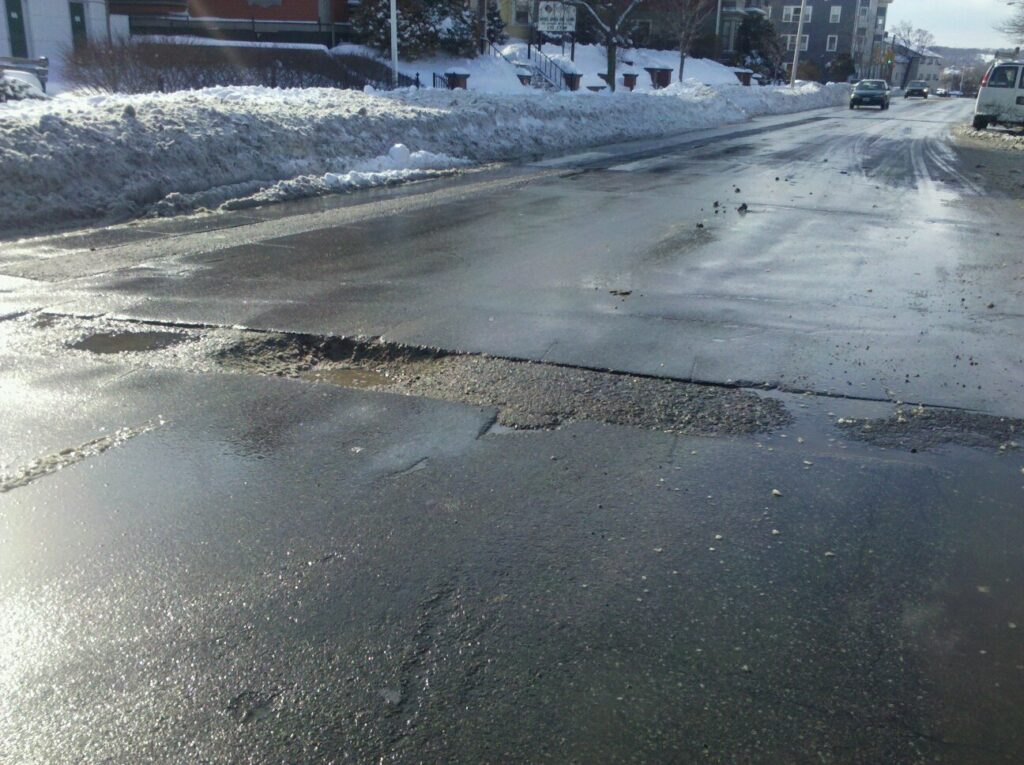Potholes are an unfortunate reality of RI driving, and if you hit one the government should reimburse you at least partial repair costs. But filing a successful claim might make you feel as if your car chased a white rabbit down into that pothole. State law §24-8-35 sets the rules, and the Department of Transportation (DOT) does their best to carry them out, but the process is complicated.
DOT encourages people to call when they spot a pothole at 401-222-2450 weekdays 8:30am – 4pm and 401-222-2378 outside those hours.
The DOT website explains the four different types of damage claims: (1) vehicle damage in a construction zone, (2) pothole damage not in a construction zone, (3) plows running over mailboxes, and (4) everything else. To be clear, there are different claims processes depending upon whether the pothole was caused by construction or simple roadway wear and tear.
The damage to your vehicle must have occurred on a road maintained by the state as opposed to cities and towns, and the DOT website provides a map to enter an address and see who maintains the road. The results can be surprising: while all interstate highway qualifies, there are seemingly arbitrary distinctions. For example, in Pawtucket both Armistice Blvd and Central Ave are state-maintained east of George R. Bennett Hwy, but city-maintained west of it. Cities and towns may each have their own damage claim processes and rules.
Not in construction zone
Outside a construction zone, the law requires a claim be filed in writing no more than seven days after the damage is sustained. After filing the initial claim, you have up to 60 days to file supporting documents: (1) a copy of the valid RI registration for the vehicle; (2) copies of itemized, paid receipts with a proof of payment provided and the current odometer reading on the repair bill; and (3) one of either (a) a copy of a police report, (b) a tow receipt, or (c) an auto club report. If the vehicle is not registered in RI, to be eligible it must be registered in a jurisdiction (state or province) that would allow a reciprocal claim if a RI-registered vehicle were damaged while traveling there. Police reports can be filed with local cities and towns, but for interstate highways they should be filed with the State Police.
The law requires payment be made no later than 45 days after a favorable decision, but there is no time limit on how long the decision can take.
There is a statutory maximum of $300 per incident, and the law disallows suing the state in court.
In construction zone
In a construction zone the rules are similar, but you have 60 days to file a claim after damage is sustained and all vehicles are eligible regardless of where they’re registered. The $300 limit does not apply, presumably because ultimate liability rests with the private construction contractor.
A specific form is required, downloadable from the DOT website – the “Construction Work Zone Claim Incident Report Form,” and also (1) a copy of the valid registration for the vehicle, (2) a copy of the paid invoice for damages only, (3) photos, and (4) a police report.

What actually happens
On Jan 27, 2011, I hit a pothole in Providence on Westminster St heading westbound just before crossing Bainbridge St. That’s a major urban artery, but there was a lot of snow, and water filled up the remains of a utility trench where an asphalt patch had been torn out by plowing. (See photo.) My car incurred nearly $1,000 in tire and front-end damage. I called the police to the scene and filed a report, and my car was towed by AAA to a repair garage.
I had to pay out of pocket for the repairs, and I started a claim with the city immediately.
I heard nothing until Apr 6 when I received two letters, one from the city postmarked Apr 1 saying the pothole was a state responsibility so my claim would be forwarded, and one from the state postmarked Mar 31 saying the pothole was caused by a construction project carried out by National Grid pursuant to a state permit. The Providence legal department took two months to decide the pothole was a state rather than city responsibility.
At the time, National Grid required all communication by postal mail, although they now have web and e-mail for this. I sent a claim form with all supporting documentation on Apr 18, using certified mail that they signed for on Apr 20. Hearing no response at all, on May 19 I sent a follow-up letter giving them two weeks to pay or be sued. On May 24, I received a check for the full amount of damages.
Overall, I had to wait four months to be reimbursed and bounce from city to state to private company, but I did eventually get the money: be persistent and don’t get discouraged.